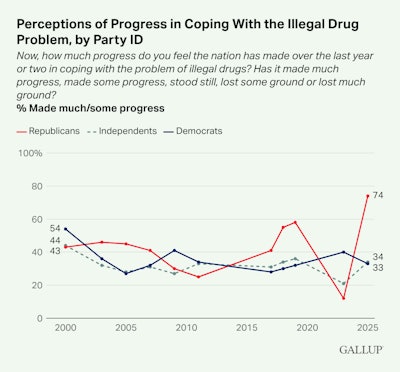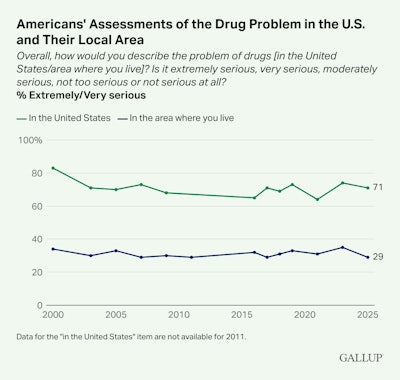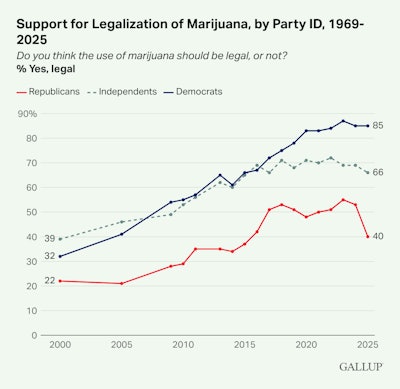GOP Support for Cannabis Legalization Dwindles to 40% Under Trump | How to order Skittles Moonrock online
Learn how to buy marijuana online. TOP QUALITY GRADE A++
Cannabyss Inc. is the best place online to buy top quality weed, cannabis, vape, marijuana and CBD products. Get your borderless orders delivered at the pickup spot with ease. Top Grade products for client satisfaction.
👉 Click here to Visit our shop! 🛒
The majority of Republicans in the U.S. no longer support legalizing cannabis under President Donald Trump.
After reaching an all-time high of 55% in 2023, Republicans who think cannabis should be federally legalized in the U.S. dropped to 40% in 2025, the lowest mark since 2015 (37%), according to Gallup pollsters.
The Gallup survey, conducted Oct. 1-16, included a random sample of 1,000 adults aged 18 and older from all 50 states and Washington, D.C.
At the same time, 74% of Republicans feel that the Trump administration has made progress in “coping with the problem” of illegal drugs over the past year, after only 12% of Republicans felt that way in 2023 under President Joe Biden.
wrote. “After climbing in the 2010s, Republican support for legalization had stalled at around 50% before retreating sharply this year – another policy area in which there has been a reversal of Republicans’ recent movement toward more progressive attitudes.”
“Americans are more encouraged about the nation’s progress in dealing with the problem of illegal drugs, but this mainly reflects improved Republican perceptions under Trump and his aggressive actions to limit the entry of drugs into the U.S.,” McCarthy wrote. “The White House has used the issue as justification for actions in various international dealings since Trump’s inauguration – from tariffs to military strikes to foreign aid – and this seems to be resonating with the president’s base, even though the impact of these actions on drug imports, sales and addiction in the U.S. is unclear so far.”
While 74% of Republicans feel that the Trump administration has gained ground on the nation’s “illegal drug problem,” only 33% of Democrats and 34% of Independents feel that way, according to Gallup.

This GOP perception of making progress on illegal drugs comes as Trump continues to order Defense Secretary Pete Hegseth to carry out military strikes on alleged drug trafficking boats in the Eastern Pacific Ocean and Caribbean. Since early September, the U.S. has carried out more than a dozen of these strikes, killing more than 60 people whom the Trump administration refers to as “narco-terrorists,” according to ABC News.
The White House hasn’t provided the identities of those killed.
In March, Trump designated the Venezuelan Tren de Aragua (TdA) as a foreign terrorist organization that has “unlawfully infiltrated” the U.S., stating that, in addition to murders, kidnapping and human trafficking, the TdA has used drug trafficking “as a weapon against our citizens.”
Many of the Defense Department’s vessel strikes have eliminated targets off the coast of Venezuela in South America.
In carrying out another “legal kinetic strike” on Nov. 4 in the international waters of the Eastern Pacific, Hegseth posted another unclassified video of the strike on X.
“Intelligence confirmed that the vessel was involved in illicit narcotics smuggling, transiting along a known narco-trafficking route, and carrying narcotics,” Hegseth wrote. The Defense Department hasn’t provided the public with evidence as to what drugs, or how much, these vessels were carrying.
In addition to the vessel strikes, U.S. Attorney General Pamela Bondi has made the nation’s fentanyl crisis a keystone priority since taking the helm in February at the Department of Justice, which encompasses the Drug Enforcement Administration.
Bondi said that during Trump’s first six months in office, the DEA seized roughly 44 million fentanyl pills, 4,500 pounds of fentanyl powder, nearly 65,000 pounds of methamphetamine, more than 201,500 pounds of cocaine, and made more than 2,100 fentanyl-related arrests.
“Our DEA agents are doing historic work to keep our communities safe from deadly drugs like fentanyl and dismantle the cartels selling them,” Bondi said.
While fentanyl, cocaine and methamphetamine are Schedule II drugs under the Controlled Substances Act, cannabis remains listed as a more dangerous Schedule I substance. Yet, under the Trump administration, the DEA isn’t going after state-sanctioned cannabis operations.
Although Trump indicated during his 2024 campaign that he’d move toward loosening cannabis’s federal status by rescheduling the plant as a Schedule III drug, the president’s only promise since his inauguration is that the White House is “looking at that” and will make a decision in the “next few weeks.” Those comments came in early August.
With the administration more focused on advertising its war on drug traffickers and cartels than on cannabis reform, Americans’ perception of the seriousness of the drug problem in the U.S. decreased slightly from 74% in 2023 to 71% in 2025, according to Gallup.
That perception also dipped from 35% to 29% for Americans who believe there is an extremely serious or very serious drug problem in their local areas.

“Republicans (51%) remain more likely than Independents (34%) and Democrats (22%) to describe the national drug problem as extremely serious, but the three groups are all similarly likely to describe local problems this way,” McCarthy wrote.



Leave a Reply
Want to join the discussion?Feel free to contribute!